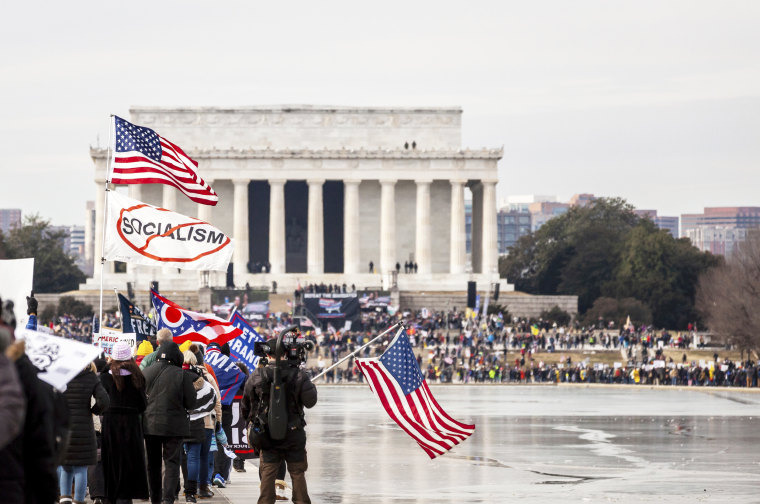House Republicans introduced a measure this week calling for Congress to condemn “the horrors of socialism.” It was bait. And most Democrats took it.
The 109 Democrats who joined every Republican in the House to vote in favor of the nonbinding resolution lent their voice to the initiative, but their support will have no tangible effect on policy. Still, it is a victory for the GOP, which has succeeded in a strategic effort to jam a wedge into the Democratic caucus, further stigmatize the left, and cook up some cynical ads for the next election cycle.
The resolution states that “socialist ideology necessitates a concentration of power that has time and time again collapsed into Communist regimes, totalitarian rule, and brutal dictatorships.” Its specific condemnations of the horrors of socialism focus primarily on the brutal communist regimes of 20th century authoritarians like Josef Stalin and Mao Zedong.
But it deliberately makes no distinction between those regimes and more contemporary leftist projects with commitments to democracy. For example, in the resolution Stalin is puzzlingly grouped together with late Venezuelan President Hugo Chavez. Stalin was infamous for horrific autocratic repression, which included mass imprisonment and executions. By contrast, Chavez operated as the popular head of an affluent modern democracy in Latin America, and he did a great deal of transformative economic good for his country with his interpretation of socialist principles, even while under siege from the United States. (This isn’t to defend everything Chavez did, but to say he committed some of “the greatest crimes in history” is absurd.)
The purpose of the resolution is to eliminate any difference between 20th century authoritarian communism and the rising popularity of democratic socialism in the U.S. today.
More broadly speaking, the purpose of the resolution is to eliminate any difference between 20th century authoritarian communism and the rising popularity of democratic socialism in the U.S. today. By painting everything associated with “socialist ideology” with one broad brush, the resolution seeks to put Mao’s Cultural Revolution in the same bucket as Vermont senator Bernie Sanders’ call for a “political revolution,” which really means a mass mobilization on behalf of social democratic demands like Medicare-for-all and free child care. The effect is to smear the small but growing democratic socialist bloc in Congress and vital organizations like the Democratic Socialists of America that are positively transforming political possibility in America. Which is unfortunate, because on issues such as health care, student debt, wealth inequality and climate change, socialist advocacy and activism have been pushing mainstream politics in the right direction in recent years.
It’s short-sighted for Democrats to bandwagon with Republican efforts to vilify socialists. One clue as to why: the GOP’s refusal to accept Democratic Rep. Mark Pocan’s amendment to the resolution clarifying that opposition to socialism in the U.S. does not include programs like Medicare and Social Security. Pocan’s read on why the GOP objected is useful here:
More and more members on the other side of the aisle are calling for cuts to Social Security and Medicare, and many have referred to these programs as socialism throughout their existence. The other night in the Rules Committee, they showed their cards. Republicans refused an amendment to declare that Social Security and Medicare is not socialism. This resolution is little about intelligent discourse and everything to do about laying the groundwork to cut Social Security and Medicare.
Pocan is right. The GOP has long been in the business of attacking any kind of government social service as “socialism,” and this theatrical bid to rally lawmakers to condemn socialism is a part of that project. By exploiting Democrats' pathological fear of being perceived as radicals, Republicans are once again forcing Democrats to take a defensive posture on the question of social spending.
This is why the chair of the Congressional Progressive Caucus, Rep. Pramila Jayapal of Washington, said she counseled her caucus to vote against the resolution because “however you vote on this bill, they’re going to use it against you, so it doesn’t really matter.”

The silver lining here is that more than 80 Democrats did see through the GOP’s tactic and voted against the resolution, and another 14 voted “present,” meaning they declined to take an official position on it. Such an outcome would’ve seemed impossible a decade ago, when socialism still carried more of a stigma.
But Democrats still have a long way to go. The Democratic establishment is still largely hostile to even incrementalist left-wing principles, and it must learn that theatrical left-punching will do little to improve its fate. Ultimately embracing its left wing will yield better results for the American people than living in constant fear of association with the s-word.

